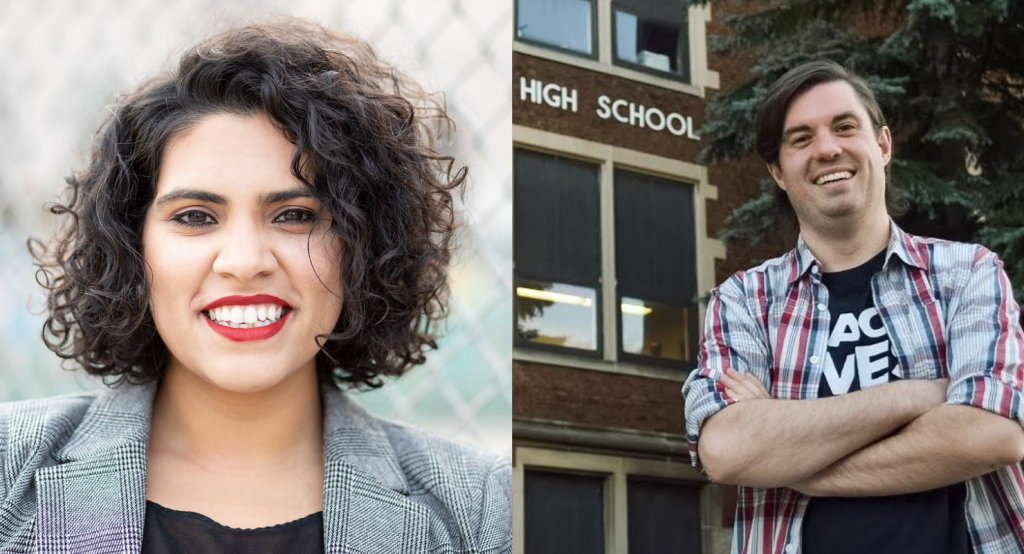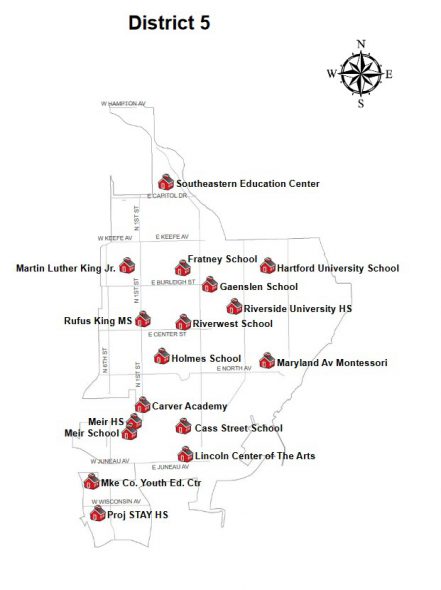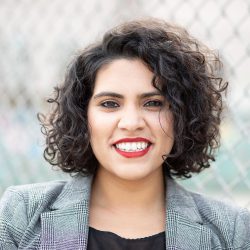Meet the District 5 School Board Candidates
Alex Brower and Jilly Gokalgandhi compete to replace outgoing school board director Larry Miller.
On Tuesday, voters head to the polls again – as four of the nine seats on the Milwaukee Board of School Directors are up for election.
Candidates Marcela Garcia and Henry Leonard are each running unopposed – in Districts 6 and 7, respectively. But there are contested races in Districts 4 and 5.
In District 5, which includes parts of Harambee, Riverwest, Downtown and the East Side, Alex Brower and Jilly Gokalgandhi are vying to replace outgoing school board director Larry Miller.
Early voting is open at City Hall until 5 p.m. Friday. You can find your Election Day polling place here.
Below are short biographies on the candidates, as well as their answers to three questions about why they feel they are qualified and what they think about some of the school board’s current issues. You can find more discussion on current issues from District 5 candidates here.
Answers have been edited for length.
Jilly Gokalgandhi
Age: 29
Education: Bachelor’s, international affairs and economics from Marquette University
Occupation: Equity in education strategist at American Family Insurance
Past election experience: None
Endorsements: MPS Director Larry Miller, MPS Director Bob Peterson, MPS Director Paula Phillips, MPS Director Tony Báez, MPS Director Megan O’Halloran, state Rep. Jonathan Brostoff, Citizen Action of Wisconsin, United Auto Workers, state Sen. LaTonya Johnson, state Rep. Francesca Hong, U.S. Rep. Gwen Moore, Shepherd Express, AFSCME Wisconsin Council 32, Wisconsin Conservation Voters, Tatiana Joseph, Ald. Nik Kovac, full list here.
Alex Brower
Age: 33
Education: Bachelor’s in political science from Beloit College
Occupation: Executive director of the Wisconsin Alliance for Retired Americans and a substitute teacher for Milwaukee Public Schools
Past election experience: None
Endorsements: Milwaukee Teachers’ Education Association, Milwaukee Democratic Socialists of America, Milwaukee Solidarity, Green Party of Milwaukee County, MPS Director Marva Herndon, MPS Director Sequanna Taylor, MPS Director Megan O’Halloran, MPS Director Erika Siemsen, Milwaukee County Supervisor Ryan Clancy, Milwaukee County Supervisor Sylvia Ortiz-Velez, Rick Banks, national Democratic Socialists of America, full list here.
1. What are the most important issues in the final election, and what is the difference between you and your opponent on these?
Brower: “MPS is under attack from privatization, systemic racism and underfunding. While I believe that both my opponent and I would agree that these are problems that need to be addressed, I am the only candidate that has consistently called for systemic change throughout this race and who has a clear track record fighting and winning real change in MPS through the school board. For example, as president of the substitute teachers union, I defeated efforts to privatize our jobs to a temp agency and won healthcare benefits for most subs by going on a 21-day hunger strike. Throughout my years as an active community leader and as a democratic socialist, I’ve proven that I have the experience, vision and political courage to fight for the real, systemic changes that our communities deserve.”
2. Why should people vote for you, and not your opponent?
Gokalgandhi: “I am a proud multilingual, millennial immigrant woman of color with a deeply held belief in social justice and valuable experience in Milwaukee Public Schools. My experience as a Community School Coordinator gives me a unique understanding of one of MPS’ most sought-after school models. I worked every day with educators, students, families, community partners, and administration. I will work closely with all members of the MPS community to make sure our work is centered on our students, advances equity and inclusion, and vigorously defends public education. Milwaukee Public Schools serves some of the most impoverished ZIP codes in the country and has a student population of approximately 90% children of color. Representation matters. My election would ensure the MPS school board remains majority people of color.”
That’s why one of my main platform points is to democratize education — ensuring that underrepresented communities have a voice in school and district-wide decision making.”
3. For Brower: In February 2020, you ran for city comptroller. Less than four months later, you registered your campaign for school board. What would you say to someone who believes you are just looking to hold any political office and are not interested in the school board specifically?
Brower: “I’ve run for office twice because elections have real consequences on my students, family and community. In my years as an active leader in Milwaukee, I’ve seen too many politicians in this city make decisions based on what will advance their political careers and get them re-elected rather than fight back against the status quo and have the courage to make the difficult decisions that will lead to systemic change. I ran for comptroller and I’m running for school board because both of these elections lacked candidates bold enough to call for systemic change and who identify as democratic socialists. After I lost the February 2020 primary for comptroller, I was exhausted and thought I’d never run for office again. Then, when the incumbent in District 5 decided not to run for re-election, people in my community encouraged me to run for this important position because I’ve been fighting for strong public schools as an MPS educator and union leader for seven years.”
Gokalgandhi: “I will tap into and learn from the work that has already been done in this space, bringing together educators and individuals who have contributed to systemwide change. I will ensure strong participation from students, parents, guardians, etc. and the community. We can create an initiative for young women and gender nonconforming students without disrupting the funding of the current Black and Latino Male Achievement Program. MPS still has a large budget for Contracted Services which needs much closer scrutiny. There are contracted services which can and should be done by MPS employees. As we continue to fight for equitable funding for MPS, I will draw on my experience in the funding community to identify partners who support public education to assist in this effort.”
5. For Brower: The Wisconsin Policy Forum recently released a report highlighting the interpersonal and institutional obstacles facing teachers of color in Wisconsin. The MPS board also recently created a task force to address the shortage of teachers in central region schools. How would you recruit and retain teachers of color in MPS, particularly to staff historically understaffed schools?
Brower: “Hiring and retaining more teachers of color is one vital component to closing the opportunity gaps for students of color in MPS and is something I will fight for on the board. A key piece in the recruitment and retention of educators of color is the need to create anti-racist school working environments. Some things I would do as a school board director to accomplish this would be to 1) fight for salary and benefit increases that are competitive with other more white and wealthy districts; 2) have mandatory anti-racist professional development trainings for all school staff and administrators; 3) include teachers of color in school and districtwide decision-making; 4) make sure that teachers of color receive the support they need — especially during the early (and usually the most difficult) years of teaching — such as providing special professional development, coaching and mentorship opportunities specifically for teachers of color.”
Gokalgandhi: “There are three components to this challenge. First, we must make stronger demands upon the state and federal governments to do their part. We must fix the state funding formula and insist upon full reimbursement for transportation, special education and other costs unique to our urban school district. We recognize that for state government, with an intransigent Legislature, that will take time, but we will help build the power for change. Second, we also must get creative about local funding, including supporting referenda to raise funds so that we have adequate resources. Third, we need to leverage philanthropy to supplement the needs of our students and stand with us in the fight for equitable funding. Clearly, philanthropy must not play a role in governance or interfere with local control of our district. As we fight for the best state funding formula and expanded federal dollars, we should do what we can to meet those student needs right now.”
This story was originally published by Milwaukee Neighborhood News Service, where you can find other stories reporting on fifteen city neighborhoods in Milwaukee.
If you think stories like this are important, become a member of Urban Milwaukee and help support real, independent journalism. Plus you get some cool added benefits.
Political Contributions Tracker
Displaying political contributions between people mentioned in this story. Learn more.
- December 19, 2020 - Marcela Garcia received $50 from Bob Peterson
- December 17, 2020 - Alex Brower received $50 from Marva Herndon
- November 28, 2020 - Alex Brower received $27 from Ryan Clancy
- November 21, 2020 - Marcela Garcia received $100 from Tatiana Joseph
- July 31, 2020 - Alex Brower received $27 from Ryan Clancy
- January 7, 2020 - Alex Brower received $100 from Rick Banks
- November 27, 2019 - Alex Brower received $25 from Sequanna Taylor
- November 3, 2019 - Alex Brower received $20 from Erika Siemsen
- October 26, 2019 - Alex Brower received $200 from Rick Banks
- September 22, 2019 - Alex Brower received $100 from Larry Miller
- September 22, 2019 - Alex Brower received $20 from Erika Siemsen
- August 24, 2019 - Alex Brower received $100 from Rick Banks
- August 14, 2019 - Alex Brower received $50 from Megan O’Halloran
- July 13, 2019 - Alex Brower received $50 from Ryan Clancy
- July 13, 2019 - Alex Brower received $100 from Bob Peterson
- February 24, 2019 - Bob Peterson received $25 from Alex Brower
- January 24, 2019 - Bob Peterson received $25 from Megan O’Halloran
- January 18, 2019 - Bob Peterson received $30 from Paula Phillips
- January 14, 2019 - Bob Peterson received $1,000 from Larry Miller
- November 29, 2018 - Bob Peterson received $50 from Tony Baez
- November 29, 2018 - Bob Peterson received $25 from Marva Herndon
- August 26, 2018 - Bob Peterson received $20 from Erika Siemsen
- August 26, 2018 - Bob Peterson received $50 from Tony Baez
- August 26, 2018 - Bob Peterson received $20 from Megan O’Halloran






















